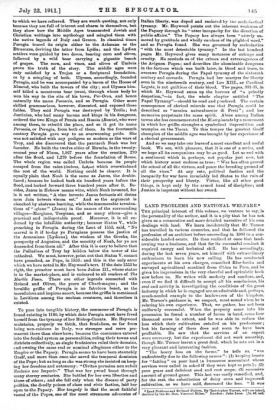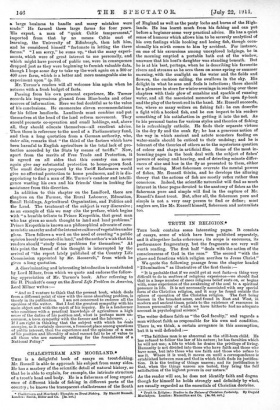LAND PROBLEMS AND NATIONAL WELFARE.* THE principal interest of this
volume, we venture to say, is the personality of the author, and it is a pity that he has not- given us a consecutive and more detailed narrative of his own dealings with land. We learn incidentally that Mr. Turner has travelled in. various countries, and that he followed the profession of an. architect before succeeding in 1903 to a con- siderable landed estate. He then realized at once that land- owning was a business, and that for its successful conduct it required energy and technical skill. He has accordingly, during the last seven years, set himself with extraordinary enthusiasm to learn his new calling. He has conducted experiments at his own charges, consulted Blue-books and surveyed agricultural mankind from China to Peru, and he gives his impressions in the very cheerful and optimistic book now before us. He writes with modesty and candour, and, even if we find it difficult to accept all his conclusions, his zeal and activity in investigating the conditions of the great industry in which he is engaged are an admirable and, perhaps, much-needed example to the landowners of the kingdom. Mr. Tumor's gal-dance is, we suspect, most sound when he is relating his own experience. That, we gather, has not been uniform/y successful. When the property came into his possession he found a. number of farms in hand, some four thousand acres in extent, and he was able to reduce the- loss which their cultivation entailed on his predecessor ; but his farming of them does not seem to have been profitable. He saw that the services of an expert. were necessary, but the experiment did not work smoothly, though Mr. Turner learnt a great deal, which he sets out in a very pleasant and interesting fashion. "The heavy loss on the farms," he tells us, "was undoubtedly due to the following causes ": (1) keeping beasts for "fatting" on poor land (a humorous accountant whose services were called in asked if they were kept as pets !) ; (2), poor grass and deficient seed and root crops; (3) excessive amount of ground game. This last was easily remedied, and, for the rest, the substitution of dairy cows and improved cultivation, as we have said„ decreased the toss. "It was *Land Probleers and Hatfoael Fraffars. By "Inistepher Turner, wit', insintrol duction by the E. Hon. Viecount Milne." London John Lane. lye. ed. Bet.
a large business to handle and many mistakes were made." He farmed three large farms for four years.
His expert, a man of "quick Celtic temperament," imported from that by no means Celtic seat of learning, the University of Edinburgh, then left him, and he considered himself "fortunate in letting the three farms." "I am sorry," he sums up, "that the many experi- ments, which were of great interest to me personally, and which might have proved of public use, were in consequence dropped just as they were beginning to furnish valuable data, though I hope some day to take up the work again on a 300 or 400 acre farm, which is a better and more manageable size to experiment upon" (p. 33).
Mr. Tumor's readers will all welcome him again when he returns with a fresh budget of facts.
Passing from his own personal experience, Mr. Tumor records his impressions gleaned from Blue-books and other sources of information. Here we feel doubtful as to the value of his conclusions. He enumerates eleven recommendations for his fellow landlords. Landlords must combine and put themselves at the head of the land reform movement. They should promote co-operation and small holdings, and, above all, they should educate themselves—all excellent advice.
Then there is reference to the need of a Parliamentary fund, and then a long quotation from a German authority, who, inter alia, remarks that "the third of the factors which have been harmful to English agriculture is the total lack of pro- tection accorded by the State by means of tariffs." Now, apart from the merits of Free Trade and Protection, it is agreed on all sides that this country can never again give any substantial protection to home-grown food. The small duties proposed by the Tariff Reformers would give no effectual protection to home producers, and it is dis- appointing to find a man of Mr. Tumor's candour and intelli- gence wasting his own and his friends' time in looking for assistance from this direction.
In addition to this chapter on the Landlord, there are chapters on the Farmer, the Rural Labourer, Education, Small Holdings, Agricultural Organization, and Politics and the Land. The treatment of the subject is very discursive ; as an example of this we may cite the preface, which begins with "a humble tribute to Prince Kropotkin, that great man who has given so much thought to land and land problems."
Prince Kropotkin is known as a philosophical advocate of com- munistie anarchy and of the intensive culture of vegetables under glass. Then follows a word on the need of creating "a public opinion keenly interested in land," and the author's wish that his readers should "study these problems for themselves." At this point the thread of his thought is interrupted by the arrival of "the report lately published of the Country Life Commission appointed by Mr. Roosevelt," from which he gives a long quotation.
A discriminating and interesting introduction is contributed by Lord Milner, from which we quote and endorse the follow- ing appreciation of Mr. Tumor's book. After referring to Sir H. Plunkett's essay on the Rural Life Frobi ens in, America, Lord Milner writes :—
" And so I venture to think that the present book, which deals from a different point of view with the same absorbing problem, is timely in its publication. I am not concerned to endorse all the
opinions of the writer. But I feel the greatest by uipathy with his main object and with the spirit of his inquiry. He is a landowner who combines with a practical knowledge of agriculture a high ser.se of the duties of his position and, what is perhaps more un- common, a keen sympathy with the farmer and the labourer. . . . If I am right in thinking that the subject with which he deals occupies, as it certainly deserves, a foremost place among questions of public interest, then the experience and the opinions of a man of his position and liberality of mind cannot fail to be of value to all those who are earnestly seeking for the foundations of a National Policy."







































 Previous page
Previous page